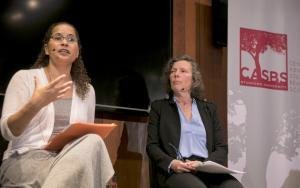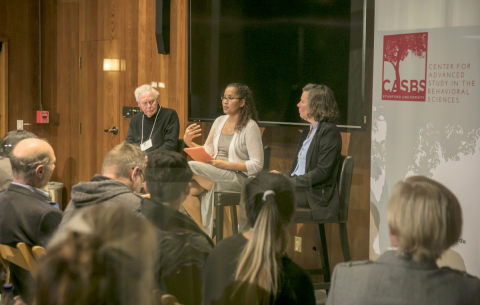
"This is drastically shaping how we see and interact with the world around us. Make no mistake…it’s an epidemic…it is not simply a crime issue. It is a public health issue. It is killing us.”
The problem of sexual assault and other forms of sexual violence in the United States was characterized in these stark terms by Vanessa Tyson, who accompanied the claim with sobering statistics courtesy of the Centers for Disease Control and Prevention.
Tyson, a 2018-19 fellow at the Center for Advanced Study in the Behavioral Sciences (CASBS) at Stanford University, spoke as a co-panelist with Jennifer Freyd, another 2018-19 CASBS fellow, as part of the public symposium “Betrayal and Courage in the Age of #MeToo,” produced and hosted by CASBS on February 12, 2019. The event was moderated by Paul Brest, a 2018-19 CASBS faculty fellow, a former member and chair of the CASBS board of directors, professor emeritus and former dean of Stanford Law School, and former president of the William and Flora Hewlett Foundation.
Freyd, a psychologist, and Tyson, a political scientist, are part of a cross-disciplinary research group at CASBS engaged in a joint project, “Interdisciplinary Perspectives on Sexual Violence: Individual, Institutional, and Structural Forces,” during the academic year. Their collaborators are historian Estelle Freedman and sociologist Elizabeth Armstrong, both also 2018-19 CASBS fellows.
The Feb. 12 event drew widespread media attention, as it marked the first public appearance by Tyson since lodging a sexual assault allegation against the lieutenant governor of Virginia, Justin Fairfax.[i] The CASBS event, however, had been in various stages of planning for several months, with Freyd and Tyson signing on as panelists in August 2018. The event proceeded as initially conceived.
And what better place than CASBS? For decades, the Center has served as the convergence point for renowned scholars studying a range of issues and themes related to gender equality and sexuality. To highlight a few: Linguist Robin Lakoff wrote a draft of her foundational book Language and a Woman’s Place at CASBS while a fellow in 1971-72. Sociologist Cynthia Fuchs Epstein and then-law professor Ruth Bader Ginsburg interacted on how to improve the legal environment for women and families when they were CASBS fellows together in 1977-78. Epstein’s co-edited book, Access to Power: Cross-national Studies of Women and Elites, was informed by her CASBS year. (She returned for subsequent CASBS fellowships in 2004-05 and 2013-14.) Political scientist Carole Pateman edited the book Feminist Challenges: Social and Political Theory as a 1984-85 CASBS fellow. Linguist Deborah Tannen wrote her landmark Gender and Discourse and edited the book Gender and Conversational Interaction as a CASBS fellow in 1992-93 (she returned in 2012-13). Feminist legal scholar Catharine MacKinnon completed her book Are Women Human? And Other International Dialogues as a CASBS fellow in 2005-06. Kimberlé Crenshaw, a 2008-09 CASBS fellow, is well known for exploring the intersections of gender, race, and identity. Other notables include political scientist Nan Keohane (1978-79, 1987-88, 2004-05); historians Carolyn Merchant (1977-78, 2017-18), Kathryn Kish Sklar (1987-88), Nell Irvin Painter (1988-89), Jacquelyn Hall (1990-91), Nancy Hewitt (1996-97), Nancy Cott (1998-99, 2008-09), Darlene Clark Hine (2000-01), Judith Walkowitz (2001-02), and Gail Hershetter (2007-08); anthropologist Gayle Rubin (2006-07, 2011-12); literature scholar Barbara Johnson (1989-90); and sociologists Paula England (2005-06), Cecilia Ridgeway (2005-06, 2012-13), Rhacel Parrenas (2010-11), Nancy Whittier (2010-11), Shelley Correll (2015-16), Barbara Risman (2015-16), and Ruth Milkman (2018-19). And this list is far from complete.
Catharine MacKinnon, notably, was in the audience at CASBS on Feb. 12 for “Betrayal and Courage in the Age of #MeToo.”
View a photo gallery from "Betrayal and Courage in the Age of #MeToo" here.
It seems the outside world finally is starting to catch-up with panelist Jennifer Freyd. She has spent much of her career developing and pioneering concepts highly relevant to understanding and explaining aspects of our culture that are by no means new, but which have been laid bare as never before by the #MeToo movement. She briefly sketched some of those concepts for the audience.
In order to better understand social and relational elements of traumatic stress – for example, from various forms of sexual violence – partly during her first CASBS fellowship, in 1989-90, Freyd developed betrayal trauma theory. As a highly social species, humans from an evolutionary standpoint are disposed to engage, get close, form attachments, and as a result are sensitive to being cheated. Relationships, moreover, are sometimes asymmetric; a person with more power and resources may act as, say, caregiver or supervisor to another. It’s a dilemma, then, when the person upon which the more vulnerable depends is the one who betrays (say, through sexual violence). There is a survival advantage, and a way out of the dilemma, if the vulnerable does not see the betrayal – “betrayal blindness” – for what it is. The result is “toxic,” according to Freyd, and predicts a host of downstream negative physical, mental, and behavioral outcomes.
In addition to individuals, institutions – churches, universities, governments, the entertainment industry, and more – can betray victims as well. When they do, “institutional betrayal” – another Freyd concept – has a compounding effect, layered on top of the initial interpersonal betrayal.
“Instead of value-added it’s like harm-added,” she said.
How people and institutions respond to charges of betrayal matters. One pernicious and, unfortunately, often effective behavior-strategy employed by alleged perpetrators is to deny, attack, and reverse the victim and the offender – DARVO, a term coined and elucidated by Freyd in the 1990s.
One way to mitigate DARVO behavior? Education and awareness of it, then calling it out. And indeed, search engine queries and social media searches show that DARVO awareness is, at long last, gaining traction in the public consciousness and discourse. With persistence, we should witness the DARVO strategy losing its potency over time.
The proper antidote to institutional betrayal? “Institutional courage,” a more recent Freyd concept to which she is devoting much of her current CASBS fellowship. Despite the good intentions of most people within them, institutions themselves have shown a tendency to gravitate towards behaviors that are betraying, according to Freyd. Reform is achievable, however, and she has outlined a number of research-based, scientifically sound steps that have the potential to yield “transformative” results.

“This is a fixable problem,” Freyd said. “We can’t change the past…[but] we can begin right away to change our institutions to reduce institutional betrayal and nurture institutional courage.”
In her presentation, Vanessa Tyson described listening to Christine Blasey Ford’s recounting of her own alleged sexual assault in the 1980s.
“As she shook, we shook with her,” said Tyson.
The experience led Tyson to focus on understanding the weight someone else carries – a “dynamic of empathy” and a process of “empathetic absorption” – a concept she is developing in her CASBS year research.
Tyson separately referenced ongoing work at CASBS on what she called “compounded vulnerabilities and cumulative inequality” – the ways different types of vulnerabilities may affect us. She tied the work to existing strands of cross-disciplinary work on black feminism, critical race theory, and intersectionality – intersections of race, ethnicity, gender, sexual orientation, religion, and disability – of identities.
“All of these are vulnerabilities that may lead someone else to identify you as easy prey, as a target,” she said.
During discussion, moderator Paul Brest asked about policy recommendations relating to institutional betrayal. Because of widespread, problematic belief that other institutions have problems but not one’s own institution, Freyd emphasized systematic (anonymous survey) data collection and sharing. Very good tools now are available for measuring victimization, as one example.
“This can be done if it’s done in a scientifically sound way. You have to start there. Otherwise nothing else will follow,” Freyd said. “The next step would be education about responding well.”
For instances of institutional betrayal at colleges and universities in particular, Tyson focused on the legal mandatory reporting of sexual harassment and sexual violence that states like California impose on professors. It’s a difficult issue when counseling victims and survivors who already are traumatized.
She tied the issue to institutional courage, where the goal is to create a safe space at universities and other institutions where abuses of power are not tolerated. But abuses nevertheless still occur.
“I understand both sides of the issue but…sometimes students come to you because you’re the only person they can turn to. You’re the only one they can trust. …Do you betray their wishes? …Survivors aren’t in a position of power, and what little control they have left – do we take that from them? Do we betray their confidence?
It’s something she, other university officials, and public policymakers are grappling with.
A number of questions were submitted by the audience on note cards. To a question about countervailing DARVO tactics, both panelists agreed that the behavior is easy to spot once one knows what to look for. One can more easily deconstruct the power dynamics that are taking place.
Then, instead of letting a controversy become a he said-she said tennis match, just “take the tennis ball away,” Tyson said.
Debating what happened on one night may or may not be knowable “in some epistemological sense,” noted Freyd. What we can do, though, is observe DARVO maneuvering right in front of us.
“We could analyze that,” said Freyd, and then say, ‘Is this behavior acceptable? Is this involving a power abuse?’ And hold people accountable for what we can see.”
“If we focus on what we can know, we are going to do a lot better than getting stuck on what we can’t know.”
To a question on how to inspire women and girls when the justice system sometimes slaps perpetrators on the wrist, if at all, Tyson was ready.
“Sometimes you have to lead by example, no matter how hard it is.”
Paul Brest took a long, quiet pause before moving on to the next question.
* * *
Further reading and exploration
Freyd, J.J.& Birrell, P.J. (2013). Blind to Betrayal. John Wiley & Sons.
Freyd, J.J. (2018). When sexual assault victims speak out, their institutions often betray them, The Conversation, 11 January 2018.
Harsey, S., Zurbriggen, E., & Freyd, J.J. (2017). Perpetrator Responses to Victim Confrontation: DARVO and Victim Self-Blame. Journal of Aggression, Maltreatment, & Trauma, 26, 644-663.
Freyd Dynamics Lab web site: https://dynamic.uoregon.edu/
Tyson, V.C. (2019). Understanding the Personal Impact of Sexual Violence and Assault, Journal of Women, Politics, & Policy, 40-1, 1-10.
Tyson, V.C. (2018). Looking Forward: The Contours of Women's Representation in U.S. Politics, in Tan, S.J., and DeFrank-Cole, L., eds. Women's Leadership Journeys: Stories, Research, and Novel Perspectives. Routledge.
Project on Institutional Courage
For a sampling of reporting about this aspect of the event, see articles by the Washington Post, Associated Press, Politico, San Jose Mercury News, KQED, CBS News, NBC News, Today, Fox News, New York Media, Daily Mail, The Daily Princetonian, and The Stanford Daily. The Associated Press article was published by the New York Times, ABC News, Time, USA Today, U.S. News & World Report, Chicago-Sun Times, Los Angeles Times, Boston Globe, Newsday, and many other media outlets.
